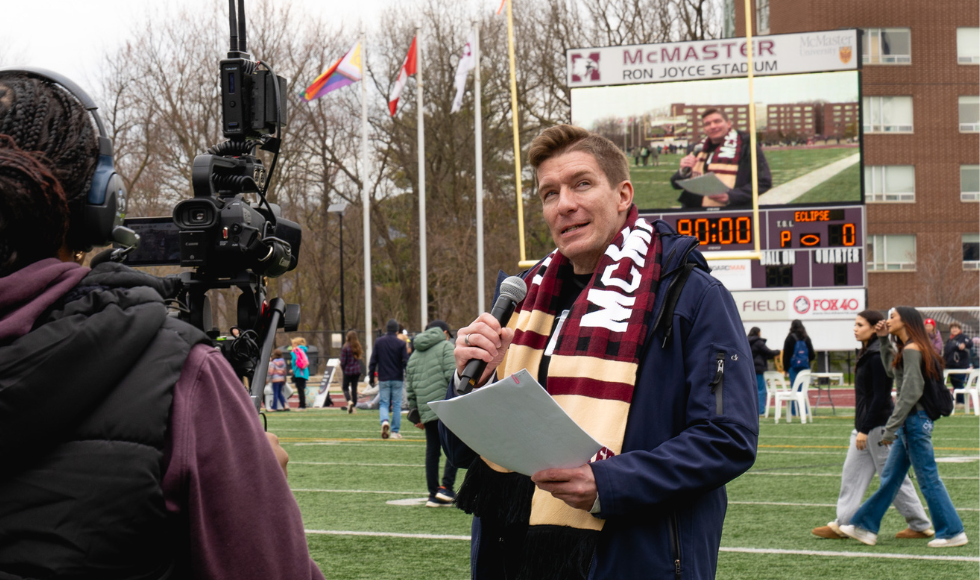7 years of planning for 90 seconds of darkness: Worth it

It took an astronomical effort, but Professor Robert Cockcroft's eclipse outreach dreams — giving away eclipse glasses, hosting an Indigenous astronomy panel, running special planetarium shows and hosting a free on-campus viewing party — all came true. (Photo by Georgia Kirkos, McMaster University
BY Jay Robb
April 25, 2024
Robert Cockcroft spent seven years getting ready to deliver the biggest and best planetarium show of his life on April 8.
The show, and the build-up to the total solar eclipse, exceeded all of his expectations.
“Absolutely incredible,” says the celestial party planner and assistant professor in the department of Physics & Astronomy.
The wheels started turning in 2017, when Cockcroft and his husband were in Tennessee with friends to watch the total solar eclipse.
When he got back, Cockcroft began talking about the 2024 eclipse with students in all his astronomy classes. And in May 2021 — “long before it was on most people’s radar” — he called the first meeting to plan how McMaster could celebrate the eclipse.
Everything Cockcroft dreamed about — giving away eclipse glasses, hosting an Indigenous astronomy panel, running special planetarium shows and staging an on-campus viewing party — came to pass.
“Definitely the outreach highlight of my career,” says Cockcroft.
So what is he most proud of?
“We were able to celebrate this once-in-a-lifetime event with so many people,” he says. Connections were forged and strengthened on campus and in the community in the leadup to the big day.
“Those connections and celebrations wouldn’t have happened without the support of Provost Susan Tighe and Dean [of Science] Maureen MacDonald and the incredible work by Michelle Ball and Nicole Dal Ferro.”
Cockcroft remembers how quiet it was during the 2017 eclipse. With Ron Joyce Stadium packed with students, alumni, faculty, staff and community members, this year was nothing like that.
“The soundtrack for this eclipse was the roar of thousands of people anticipating and then responding with pure joy at what we were witnessing together.”
Cockcroft got to experience that moment with his husband and the same friends who made the trip seven years ago to Tennessee. His mom was also there.
“My parents have always supported whatever I wanted to do in life,” he says. They flew over from the U.K. to Canada for my PhD graduation.
“My mum was with me the entire day on April 8 — meeting lots of people from 8 a.m. in a cold and empty stadium right through to very end of the day. My dad recently passed away so it meant the world that my mum and my husband were together with me for the eclipse. We kept my dad in our thoughts throughout the entire day.”
Relive the magic of the total solar eclipse at McMaster
So what’s next for Cockcroft? He’s already looking ahead to eclipses around the world. Hamilton won’t see another total solar eclipse until 2144, “but if you’re willing to travel, there are lots of options.”
A friend recently pitched Cockcroft on the idea of helping with astronomy-themed cruises.
Closer to home, Cockcroft is excited to expand the reach of the department’s permanent and portable planetariums, and continuing to collaborate with Indigenous scholars to on Indigenous-themed astronomy shows.
“Having my inbox return to normal levels is great, but I’ll definitely miss the buzz and excitement of working with so many people and connecting with lots of community members.”
Eclipse outreach
- 600,000 free eclipse glasses distributed on campus and in the community
- Distribution partners include Hamilton Wentworth District School Board, Hamilton Wentworth Catholic District School Board, Grand Erie School Board and the Hamilton, Burlington, Norfolk, Brantford, Brant County, Six Nations and Haldimand public library systems
- 7,316 people attended eclipse talks, lectures and shows delivered by faculty, graduate students and eclipse ambassadors
- 25 eclipse ambassadors
- 150 attendees at the Indigenous Astronomy Panel
- 124 planetarium shows with eclipse content
- 20 eclipse-themed shows in the W.J. McCallion Planetarium
- 10 portable planetarium shows in the community
- 69,000 unique visitors to the planetarium website
- Sold-out viewing party at Ron Joyce Stadium — all 5,600 advance tickets given away
- Extensive national media coverage, including live coverage by CTV National from the Ron Joyce Stadium


